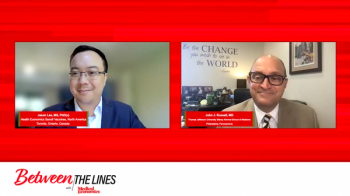
The 2022 Physicians Foundation survey found 80% of physicians feel there is stigma attached to physicians seeking mental health care.

The 2022 Physicians Foundation survey found 80% of physicians feel there is stigma attached to physicians seeking mental health care.

Speaker Kem Tolliver, President and CEO of Medical Revenue Cycle Specialists, LCC, shares tips on how to streamline the billing process and discuss how automation can be a game changer. During this webinar learn how Inovalon helps providers capture and retain more revenue through a centralized approach to billing and claims management.

Health care systems will change when more leaders realize how expensive it is to replace physicians who leave because of poor workplace conditions.

Making electronic health records more user friendly, while adding to physician flexibility and autonomy, are practical solutions that could reduce physician burnout.

Physicians have analyzed conditions that contribute to workplace burnout – but corrections have been slow to come.

Gary Price, MD, MBA, president of The Physicians Foundation, reacts to a new Foundation survey finding that 62% of physicians feel some symptoms of job-related burnout.

Raising public awareness and developing concrete solutions about workplace burnout and mental health care in the United States.

Primary care physicians deserve gratitude for their work, says J. Corey Feist, JD, MBA, cofounder of the Dr. Lorna Breen Heroes’ Foundation.

In a number of forums, asking physicians about prior mental health conditions or treatment create barriers to seeking help when they need it.

An interview with Change Healthcare's Arien Malec about public health, EHRs and building a better system.

The cofounder of the Dr. Lorna Breen Heroes' Foundation discusses the dangers of suffering in silence.

The Dr. Lorna Breen Heroes’ Foundation and the Physicians Foundation have joined to research physician burnout. J. Corey Feist, JD, MBA, cofounder of the Dr. Lorna Breen Heroes’ Foundation, explains how the findings affect physicians and other staff. “You’ve got an environment that is set up in a way that’s not supportive of the overall well-being … of the health care workforce,” he says.

J. Corey Feist, JD, MBA, cofounder of the Dr. Lorna Breen Heroes’ Foundation, discusses differences between burnout and depression among health care workers, and why both have been a surprise for the general public, especially before the COVID-19 pandemic.

Physicians and other health care workers began learning workplace burnout was increasing before the start of the COVID-19 pandemic. J. Corey Feist, JD, MBA, cofounder of the Dr. Lorna Breen Heroes’ Foundation, uses a sports analogy to describe how the pandemic made a difficult situation worse.

The foundation’s mission to reduce burnout of health care professionals and safeguard their well-being and job satisfaction.

Physicians are human beings who, like everyone, must manage their own mental health.

Jason Lee, M.S., Ph.D.(c), and John J. Russell, M.D., discuss the future of influenza vaccination and provide key takeaways from the study.

Vaccine experts discuss coinfection with COVID-19 and influenza.

Jason Lee, M.S., Ph.D.(c), and John J. Russell, M.D., discuss the cost associated with influenza and how vaccination can provide cost savings.

The stigma of seeking mental health care for physicians and other health care clinicians and workers and assumptions of impairment due to mental health issues.

Physician burnout and depression may have some overlap, but Christine Yu Moutier, MD, chief medical officer for the American Foundation for Suicide Prevention, continues her discussion about the differences between them.

Burnout may be one of many factors that contribute to physician distress, but depression is a higher risk factor for suicide.

Christine Yu Moutier, MD, chief medical officer for the American Foundation for Suicide Prevention, explains the Foundation’s mission.

Drs. Jason Lee and John J. Russell discuss the impact of chronic health conditions on adults.

Vaccine experts discuss racial disparities and the impact on influenza vaccinations.

Jason Lee, M.S., Ph.D.(c), and John J. Russell, M.D., address vaccine hesitancy and gaps in influenza vaccines in adults.

Jason Lee, M.S., Ph.D.(c), discusses results and takeaways from the study of a high-dose influenza vaccine in older adults.


Jason Lee, M.S., Ph.D.(c), discusses the rationale, objectives, and methods for a study of the efficacy and effectiveness of a high-dose influenza vaccine in older adults.

Jason Lee, M.S., Ph.D.(c), discusses the background to seasonal influenza.